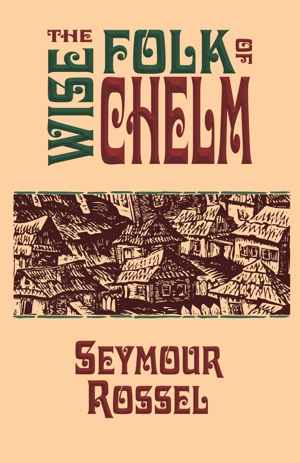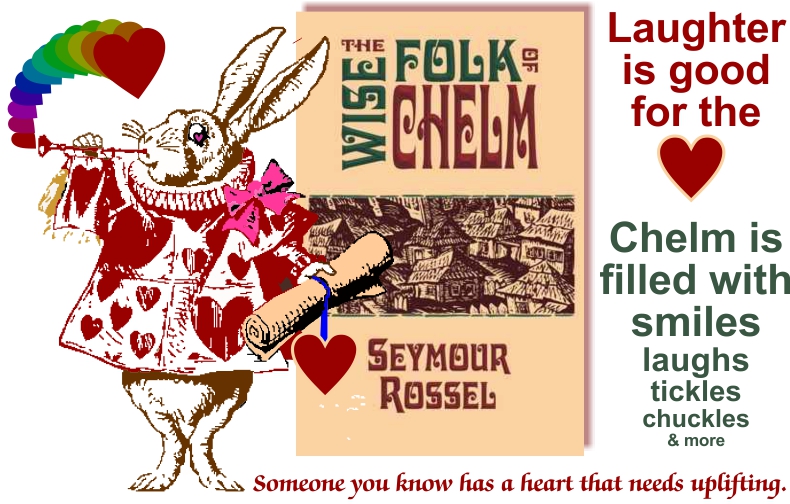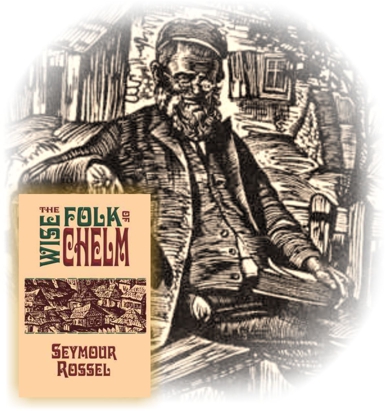
The Wise Folk of Chelm
Paperback, 176 pages, $14.95
ISBN-10: 0940646439
ISBN-13: 978-0940646438
Kindle / eBook, $9.95
The Wise Folk of Chelm
Seymour Rossel
• Welcome to CHELM! •
A cornucopia of irrepressible characters await within The Wise Folk of Chelm to welcome you to Europe’s most famous town of fools. All this, author Seymour Rossel explains, is to bring the Chelm tradition into the twenty-first century. For the past hundred years, most Chelm stories have been published for children though only a handful of the tales are child-appropriate. It is no great surprise that the same few stories regularly reappear while many of the best of the stories—those that have amused and bemused adults since the seventeenth century—largely go unseen.
For a decade, Rossel has combed the traditional Yiddish, Hebrew, and English canons of Chelm stories. He has turned up fascinating research on the origins of Chelm. He has experimented with telling the stories in so many ways to so many different groups that colleagues have taken to calling him “the Texaner Maggid,” which loosely translates as “the parable-maker from Texas.” Indeed, it has been said–mainly by his wife and children–and with some justification–that he knows his way around Chelm better than around Texas.
The Wise Folk of Chelm is Rossel’s new vision of the classic tales. First, the new heroes and heroines you will want to meet… Second, new streets to walk with them, new cafés and shops wherein to laugh with them, and new chances to attend the flamboyant, ever-surprising deliberations of Chelm’s town council… Third, Rossel serves up a new kind of narrative that begs to be read out loud. He calls it “narrative slapstick” or “slapstick narrative.” You’ll call it entertainment.
Paperback Edition
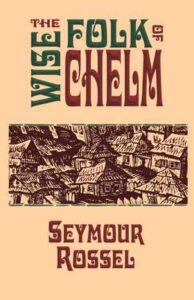
Kindle Edition

“The Wise Folk of Chelm is a delightful foray into the topsy-turvy world of the men and women of Chelm. A sweet, modern telling that will rekindle fond memories for those who grew up with the stories and bring smiles and laughter to those who have never before encountered Chelm.”
The folks of Chelm are too funny
““
The “wise” decisions the elders of the tiny village of Chelm make go far beyond the capacity of the greatest comedy or fiction writers in their contrariness to commonsense
““
“
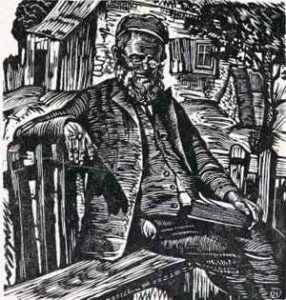
The Chelm Humor on This Page
Chelm could be anywhere. In fact, Chelm is everywhere. And the most wonderful thing about Chelm is that you can laugh at its inhabitants without worrying about being “politically correct.”
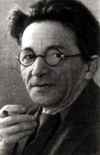
The Illustrations on This Page
He was one of three members of the famous S. An-Sky expedition from 1911-1914, collecting folktales and folk art in the Ukraine to be deposited in the Jewish National Museum in St. Petersburg.
His interest in producing Jewish art continued until the outbreak of World War II. From that time forward, he produced only patriotic Russian art.
A retrospective of his Jewish work was mounted at the Israel museum in 1991. His wonderful works are now in the public domain and I am pleased to present them here so they may be better known.
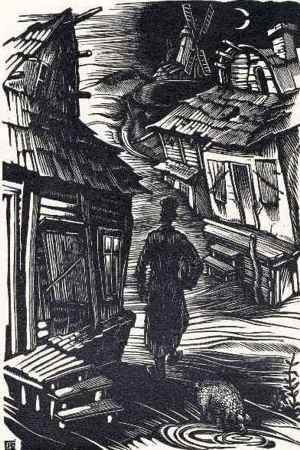
Buttering the Bread
Now, it is well-known among Chelmers that when a slice of buttered bread falls to the floor, it always falls buttered side down! This is like a commandment, a law etched in stone. So why had it fallen buttered side up?
The issue was referred to the council of the elders of Chelm. They discussed it for seven days and seven nights (the traditional amount of discussion, without which no decision in Chelm could ever be rendered).
The decision was delivered by the mayor who called upon Tzeitel and informed her, “My dear Tzeitel, the entire council of Chelm agrees that a slice of buttered bread always falls buttered side down. Therefore, it has been declared that you buttered your slice of bread on the wrong side!”
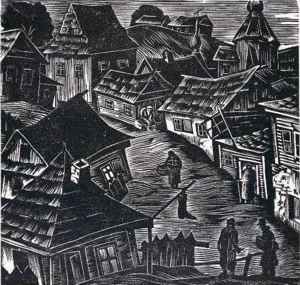
Footsteps
In the end, the elders devised a solution. Whenever snow was fresh on the ground, the shammes was directed to sit on a table. Four volunteers then lifted the table and carried the shammes through the town. Nevermore did the footsteps of the shammes of Chelm tarnish the snow!
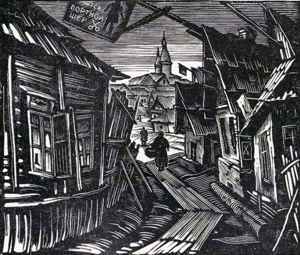
Reduced to Begging
In this wise, he arrived at the door of the widow Tzippie where he begged for food.
The kind widow asked, “Would you like some cold chicken soup?”
“Chicken soup,” Yossel replied, licking his lips. “Even cold, chicken soup sounds wonderful.”
“Return in an hour,” said the widow Tzippie. “Right now, the soup is hot, but in an hour, it should be cold.”
Paperback Edition

Kindle Edition

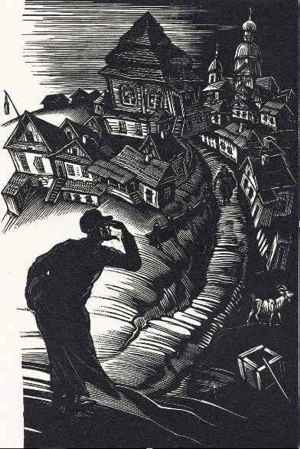
The Rain Wall
Seven days and seven nights of discussion and debate resulted in the Rain Wall Plan. The elders agreed to empty the town treasury to build a six-foot wall around the entire village of Chelm to keep the rain out. Despite the terrible conditions in which the workmen struggled, the wall was duly erected. Unfortunately, the rain would not cooperate. It continued to fall even inside the Rain Wall!
The elders met again. Their plight was dire. They had plenty of rain and no more money in the town treasury. After seven days and seven nights of additional discussion, it was decided to switch the meaning of the words. In this way, the town of Chelm suddenly had very much money and no more rain.
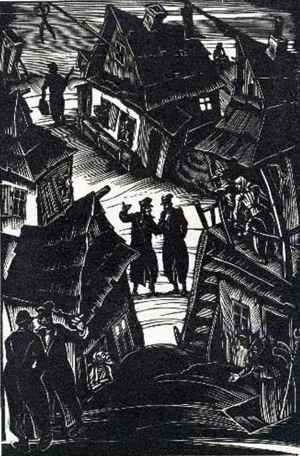
Enough Worry to Go Around
The elders discussed the problem for seven days and seven nights. Finally, they decided to appoint one person to do all the worrying for Chelm. They offered the job to Mendel the Baker whose sponge cake tasted like sponge and whose bread was most useful to Chelm’s fishermen as bait for pike.
Mendel was impressed, “All the worrying for Chelm! And for this, you will pay me?”
The elders nodded.
Mendel said, “It won’t work. If you pay me to worry, I’ll have nothing to worry about!”
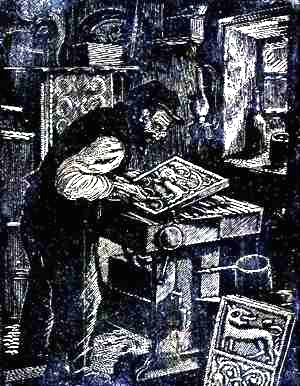
The Rabbi's Wisdom
When the rabbi was asked, “Which is more important–the sun or the moon?” he never hesitated, but replied, “The moon, of course. The sun shines in the day when we have plenty of light anyway, but the moon shines at night when we desperately need its light!”
“Rabbi,” a Chelmer asked, “does Chelm have a future?”
The rabbi responded, “Not to worry, my child. Chelm definitely has a future and we can expect it any day now.”
“Rabbi,” another Chelmer asked, “why is the ocean salty?”
The rabbi shook his head. “Just think,” he said, “is the ocean not filled with herring?”
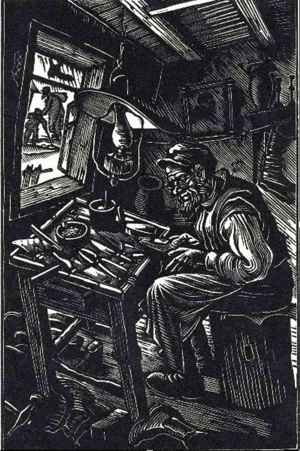
Predicting the Weather
Two of Chelm’s town elders went for a walk. Yankel the Cobbler carried an umbrella. Velvel the Butcher took only his walking stick. When it began to rain, Velvel said, “Yankel, open your umbrella and we will walk close beside one another so neither of us will get wet.”
Yankel said, “Opening my umbrella will do nothing to protect either of us.” Velvel said, “Why not?”
Yankel answered, “My umbrella has more holes than the street has puddles.” Velvel asked, “If so, why did you carry it?”
Yankel replied, “I did not expect it to rain.”
Order from Amazon


